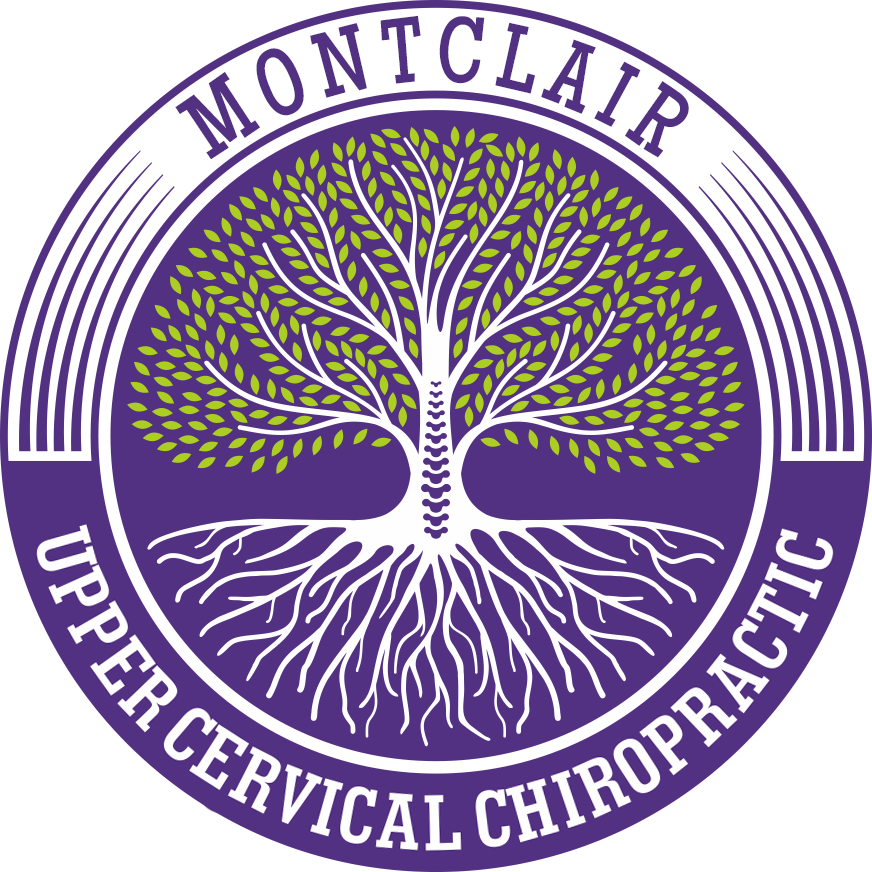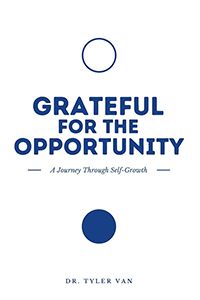
When life happens, it pulls you hard enough. Sometimes, it comes to the extent of breaking you down. But would you let life’s tension destroy you or be grateful for the opportunity for self-growth? Dr. Kevin Pecca is joined by Dr. Tyler Van, author of Grateful for the Opportunity: A Journey Through Self-Growth. He shares how he found his love for writing after facing a life-threatening cardiac event. Dr. Tyler talks about getting back on track following massive challenges and escaping the negative feedback loop.
Listen To The Episode Here
Grateful For The Opportunity With Dr. Tyler Van
In this episode, we have an amazing guest, Dr. Tyler Van. After experiencing a cardiac event at 28 years old, Dr. Tyler Van turned to writing as a way to de-stress and focus on staying positive. Writing was initially meant as a means to give advice to himself.
Yet after writing immensely, he realized the impact he could have on others if he shared what he learned from this tragic event. Dr. Tyler's story is why I made this show. People sharing their stories, leaving all the cards out on the table, recovering from something traumatic, and making their life beautiful again. It was an honor to have him on the show. I enjoyed this episode. Please, welcome Dr. Tyler Van.
We have Dr. Tyler Van on the show. Dr. Tyler, how are you?
I’m doing well. Thanks for having me. I appreciate it.
I'm so excited to have you. I was telling you before, your story is what the show is all about. A scary life situation happened to you. You took it and made something beautiful out of it. You even have a book. Is it out or it's coming out?
It's out. I have gotten some good feedback. It's been good.
I'd love to start with where are you from originally?
I'm from Bergen County, New Jersey. I grew up here. I went to Stockton University for my undergraduate work and did my graduate work at New York Medical College in Valhalla. I'm still in Bergen County. I practice in an office in Hillsdale.
What drew you to the physical therapy profession? Were sports something you were into growing up as a kid? How did that come about?
Sports was something I was always involved in. I played lacrosse in college as well. People always ask me if was there an injury that persuaded me to do PT and get into the rehabilitation side of things. While I did undergo a season-ending injury in college, I tore my meniscus. I missed my junior year. I always wanted to go into healthcare. I come from a family of healthcare practitioners. I always wanted to do something that would lead me to help people and physical therapy was perfect because I loved sports so much. I love the orthopedic side of things and that's what led me to get into this profession.
Knowing what you know now, being a physical therapist, was there anything that you could have done to come back faster from that injury or it was bad and there was no way around it?
I did opt in for the surgery. It was bad enough that if I wanted to play at the level that I was previously playing at, surgery would have still been warranted. I will never know what exactly happened but my knee locked up when I was on the ground. I put it back into extension because, at the time, I thought I dislocated my kneecap. As a 19 or 20-year-old idiot, I quickly extended my leg thinking, “Let me pop it back in.” I probably shredded my meniscus a little bit more than I originally did. Surgery would have still been warranted regardless.
Let's jump into it here. You had a very serious and almost life-ending event that happened in your life, completely unexpected. Before we get into that, I want to know what your life was like before the event happened. Was it very stressful? What was going on?
I was a previous college athlete. I'm very into health and wellness. I exercise every day. One morning, I woke up and went about my daily routine. I was going about my morning. I had breakfast. I was honestly considering going for a run and my heart started racing. At first, I thought maybe I was having a random panic attack. Life can be stressful but I couldn't pinpoint what was stressing me out. It was weird.
I had a pulse ox. I'm like, “Let me see what my heart rate is.” I put it on and it's fluctuating between 150 to 180 beats per minute at rest. I'm like, “If I'm having a panic attack, I don't know why.” I started assessing my pulse to see if it was regular and it's irregular. Normally with a panic attack, for those that have had one, you will have a regular steady heartbeat. Mine was irregular. I'm thinking, “Maybe I'm going into AFib.” I wasn't calming down. It was still staying irregular. Within probably 3 to 5 minutes, I said, “I got to call an ambulance because this is not good.”
I called the paramedics. They arrived at my house. They do the EKG. They tell me, “You are in AFib,” as I suspected. They said, “We got to take you to the hospital.” They gave me medication in the field. In the ambulance, my body didn't respond to it. I got to the hospital. They put me on an IV with another medication. There was a 50/50 chance that it would put me back into normal sinus rhythm. For those who don't know, it was to get my heart to be regularly again and that didn't work. They had to electrically cardiovert me.
What was going through your mind? Were you freaking out? What was happening?
It's weird.
Were you conscious too?
I was conscious. When I was in the ambulance, I was starting to get dry mouth and hyperventilate. I was freaking myself out a little bit. I knew I wasn't having a heart attack. I knew as a practitioner what was going on. I talk about this in my book a little bit too but when they were going to cardiovert me, I remember asking, “Am I going to die?”
As weird as that sounds, I knew I wasn't. I wasn't having a heart attack or going to go into cardiac arrest. I was fully aware of what was going on but part of me needed that reassurance to hear it from a medical doctor, as silly as that is. I knew what was happening but I was starting to freak out. When they went to cardiovert me, they told me, “We are going to sedate you and give you medication.”
At first, I told them I didn't want to be sedated or any medication. The nurses looked at me and said, “You are crazy. This is going to hurt very bad.” I fought them on it. I didn't want any medication or to be sedated at all but they convinced me to give me a little bit of medication. I was awake for it. The last thing I remember is them shocking my chest and flying off the bed screaming.
You blacked out after that.
I remember seeing my dad and my girlfriend. I was asking them to give me a bucket because I started vomiting from the pain medication that they gave me.
What happened after that? What did the doctors tell you after you passed out?
This happened on a Sunday. The next day, I went to the cardiologist.
After you passed out, how long were you out for?
It had to be short because I wasn't sleeping. I don't remember. I could have very well been conscious. I don't think I passed out or anything. I got discharged that night. This probably happened around 11:00 in the morning and I left the hospital maybe 7:00 or 7:30 at night. It's so funny to add some humor to this. My girlfriend's birthday was that Saturday and then on Sunday, we had a family dinner at 4:00 or 4:30.
I'm a big Chiefs fan and the Chiefs played with the Bills. I said, “I got to find a way to get out of your dinner because I got to watch this game.” Soon enough, I missed all the Sunday football games. I had a follow-up with the cardiologist that Monday and then further testing on Tuesday. I'm coming up to my yearly follow-up in October of 2023.
That device you had when you were taking your heart rate and pulse rate, do you think that saved your life? If you didn't have that on hand, do you think you would have continued with your day and waited it out?
I would have manually assessed myself and noticed, “It's beating very fast and irregular.” I wanted more of the pulse ox to know and give myself that reassurance because it's always nice to have that other aspect to say, “You need to start doing something because this is real. It's not in your head. You are not imagining this.
Was there anything in the day or week prior that gave you any indication that something was off or it was just that day?
No. The doctors tried to contribute it to things and they honestly couldn't find anything. The day before, I was drinking. I was out for my girlfriend's birthday so alcohol consumption could lead to AFib. I'm the first to say that I wasn't drinking copious amounts to the point where I was severely hungover. I was getting ready to go for a run. I was fine enough to go run 3 to 5 miles the day before and we were out for lunch at 2:00. It can't even contribute to alcohol drinking.
Was life at an all-stress higher than usual or was it pretty status quo?
It was pretty status quo. Nothing more than the regular stress of any healthcare practitioner. I'm sure you can attest to that too. After having further conversations with the cardiologist, stress is not even something that can induce AFib. Stress can exacerbate it and make it worse but it's not something that can put you into atrial fibrillation.
The following week, what was that like? Did you take a couple of days off from work or jump right back into it? Was there a reset button?
I was out of work for two days. I was cleared to go back. I took it easy when I was back at work but it was weird. I had upwards of 300 to 500 joules of electricity go through my body. My body was feeling it from being shocked back into normal sinus rhythm. It was weird. Being on cardiac medication for six months was also something to get adjusted to. It was odd. I'm glad I'm off of it because it affects your training and everything else and how your body's responding.
How did you cope with this serious life event? Were you always a writer? How did that happen?
Ironically, before that, I wasn't dealing with a lot of stress. There was a point in time when I was feeling not my super positive self. Positivity is something that I preached to others. I felt like work was going crazy. We were getting busy and short-staffed. Nothing out of the ordinary. Everything that could go wrong was going wrong. I'm like, “I can't catch a break.” I had a bad mentality.
I caught myself getting like that and then this happened. I started feeling like I was so unlucky. “Why do I have bad luck? I have a cardiologist at 28 years old. This is nuts.” I said, “I got to do something to get my mind right.” I can't keep digging myself into this hole, being so negative, and going against everything I preach like, “Who am I to be all over social media motivating, being positive, and then behind closed doors, I'm being this negative and miserable person, especially after what happened to me? I got to get back on track.”
I told myself, “I'm going to write for ten minutes a day. I'm going to journal for ten minutes at the minimum.” I stay disciplined enough to do that. I wake up at 4:30 in the morning and go to the gym. This is a way after I got cleared to start exercising again. I said to myself, “Ten minutes a day, I'm going to write no matter what.” It could be anything.
Get your thoughts out. Talk about what you need to talk about. It could be life, work, relationships, friendship, and family stuff. I let it out on paper. I caught myself writing for 10 minutes and then 3 hours. It varied. Sometimes I had a lot on my mind. Sometimes I'd be out on a walk or a run. I would have stuff going through my mind. I would jot it down in my notes on my phone, go back home, and type it into a Word document.
After 6 months of doing this, I realized I had upwards of 42,000 words in this Word document. I said to myself, “Maybe it would be a good idea to share this. Maybe I can construct this into something that I can publish and potentially help one other person. There have got to be people who are going through similar situations like me or even worse. Why not put that out there?”
The one thing I always preach to others is to be yourself. As cliché as that sounds, be real. Don't hold back. Don't try to fake it until you make it. I'd rather be hated for who I am than loved for who I am not. I said, “I'm going to put myself out there.” People are going to get raw emotion. They are going to see everything that I felt and dealt with. They are going to get a side of me that they have never seen before. They are going to see the sensitive side of me and the tough guy side of me. They are going to get the real me.

I put it all out there into my book. It's nice because I did it for me. I did it to help me and make me feel better. I hear people reach out and be like, “I want to commend you on putting yourself out there. That in itself takes a lot of guts. For you to do that and be so open, you inspired me.” That's also why I did it. If I can help one person, it means a lot.
What is the construct of the book like? It sounds like you have a lot of free-flowing thoughts. Are your journal entries almost on the page? Is it constructed into a story a little bit? How does that work?
I start with an introduction and then it jumps into what I call the journey begins. It's like my self-growth journey. It's free-flowing ideas. I put it down on paper. I break it up with quotes and little takeaway points. Those takeaway points were useful for me because if I had a bad day or thought I wasn't being positive, I would go back and read my takeaway points. At the time, because I wasn't writing to write a book, I was proofreading.
It was nice in terms of the editing process. When I had to go for publication, I was like, “I have read through this so many times without doing it with the intent of editing.” It helped me save a lot of time there. You will see with the book that I wrote, that paragraphs have takeaway points and quotes to break up the free-flowing ideas but also as constant reminders and summaries of what you should be doing and what I was telling myself I should be doing.
I'm a huge quote guy. Some quotes have pulled me out of some dark moments, as I'm sure they have done with you. Where did you get some of your quote inspiration? Was it from some people or some quotes you wrote yourself? How did that work?
A lot of the quotes are written by myself. A lot are written by previous people in the health and wellness industry. There are famous quotes by Henry Ford and Benjamin Franklin. It’s a stuff that pertained to what I was discussing. You will see that there are a bunch of different ideas and people that are listed.
You have a lot of free-flowing thoughts so you are writing them down and taking notes on them. Did you need any help with the actual book part? Sitting down and writing a book is not easy. How did you make the book happen?
On my girlfriend's side of the family, her grandfather's girlfriend has written multiple books. I picked her brain without telling her that I was writing books. I kept this a secret. My family didn't know until I ordered the first proof of the book. I didn't want anybody to know. The only person that did know was my girlfriend.
I was picking her brain on how to go about a publication and so on. Eventually, I had to tell her because I needed specific answers. She was a huge help in this. When it came to the editing process, I didn't hire a professional editor. The reason was that I didn't want to lose that raw authenticity. I wasn't looking to publicize this book and sounds very professional.
I wasn't trying to sound like this was me speaking to me. I wanted people to hear my voice when they read it. It's pretty nice to hear that people have reached out and who do know me and have heard me speak like, “I'm reading your book. I can hear you. It's like you are in the room.” That's what I wanted. Granted, I went through this stuff, checked for grammar, and made sure that I didn't sound like an idiot but I didn't want to lose that raw authenticity because it was my straight thoughts that I put down on paper.
Were there any quotes or passages that you took out because you thought they were too vulnerable or you left it all on the table?
I didn't take out any quotes because I thought they were too vulnerable. I did take out some quotes because it was too redundant and I said it previously. I didn't want to sound like a broken record. A lot of my thoughts that I was putting down on paper at the time, I realized, “I did say that days ago. When it is computed into the book, it would be like something that I said on page 20, I also said on page 150.” I would move stuff around and stuff that I would take out because I didn't want it to sound broken. Some of the stuff I also kept as a reminder for somebody who's reading my book.
It's not meant to be read all in one shot. I want people to read 10 to 20 pages at a time. If they got to that later, they probably would forget that I already said it anyway and it would be another reminder. Back to your original question, I kept everything and stayed as raw as possible. I didn't take anything out because of vulnerability. I didn't care. I wanted to be vulnerable. That's probably one of the first things I say in my introduction. Be real and vulnerable. See the beauty in that.
The title of the book is called Grateful for the Opportunity. Let's talk about gratitude. Has your ability to express and feel gratitude after this incident shifted and changed more than previously?
It proved more that you need to be grateful for the opportunity. I try not to plug that in but it always happens. You need to take every instance that occurs to you and turn it into a positive. I could have dwelled. I could assault and say, “This was a crappy situation. I'm not going to come back from this. I'm not going to be the same athlete if worse happens to me or my heart is never the same.” At the end of the day, I wouldn't have this book, wouldn't have had the opportunity to share my story, and wouldn't be here having this conversation with you if this never happened.
Anytime something is either deemed as a setback or negative, I try my best not to view it as that. I have some mental lapses sometimes where I need to be put in check and I have people around me like, “Practice what you preach.” I'm like, “You are right. I'm back on track.” By no means am I perfect. I'm not this enthusiastic positive guy. I'm still trying my best to be but I wouldn't be real if I sat here and said, “I'm never negative. I'm the most positive person you will ever meet.” Being positive is a discipline and it takes time. You have to keep working at it.
I have been studying positive thinking and self-help books for several years. There are periods when I forget everything that I have learned. How do you stay disciplined? It's very easy. We all innately know we need to be positive. It's going to have such a better outlook and effect on our lives. What is one of the disciplines you do to keep on track or snap yourself out of that negative loop?
Reading positive books written by other people is a great way to get yourself back on track. Writing and rereading what you have written is also a great way because, at the same time, you are reminding yourself what you already know and what's embedded deep within you. If you go back and read your own words, you have the tools. You just have to present it.

Touching base with other positive individuals and surrounding yourself with positive individuals, those who share the same values and morals, are great ways to get back on track. If you are going to continue to surround yourself with those who sulk and are miserable or put yourself into environments that aren't conducive to your well-being, then you are never going to shift your mindset. A lot of times, it's as simple as taking yourself out of those environments.
People say all the time, “I don't feel as positive. I don't feel happy. I feel constantly sad.” It's like, “What do you do all day?” “I'm at this job from 9:00 to 5:00. I don't enjoy it. I hate it.” You need to take yourself out of it. It's easier said than done sometimes due to financial reasons and other variables that play a part but at what point is your health not worth the financial gain from your job? Your health triumphs over everything.
One of the biggest problems, especially for me, is you have to stand guard of your mind. One of the easiest ways to get in that negative feedback loop is by scrolling through Instagram. Of all the garbage that comes onto the phone and you are scrolling through hours, that immediately affects my mindset. That's what I noticed.
Another thing too going to your point is you are following all these people that are clout chasing. If those are flaunting the side of their lives that is perfect and then you compare yourself to that, you are going to find yourself not happy because you are going to be chasing something that you shouldn't be chasing.
That's why it's important to be real, be vulnerable, and show other people that being real and vulnerable is what it's truly about. If you surround yourself with those who aren't and you don't know that they are not being true and vulnerable, you are going to be chasing something that is going to lead to disappointment.
Unfollow any garbage that's affecting your mind and follow people that you want to be liked or inspired by. That's a good point. What's next for you? Since you wrote one book, do you think you want to do another one in the future? What's next for you?
I'm considering writing a second one but I keep telling myself and I will stand by this that I'm not going to force it. I'm not going to write a second book to write a second book. I have started jotting down ideas about whether I'm at the gym on a run. I have a whole document of stuff already but that's my idea and it's for me to continue to do what has worked for me. That's right for ten minutes a day.
If that turns into another book, great. If not, then it is what it is but what's important to me is that I continue to improve upon my mental well-being and I continue to stay disciplined and help myself. Naturally, I will be able to help others in the process but I'm not setting a timeframe or an end goal like, “I need to write a second book by 2025. I need to have 30,000 words written in a document in 6 months because I plan on publicizing a second written text.”
You have a very powerful story and you are already affecting a lot of people in a positive way. Is speaking anything that you enjoy doing or have your eyes sit on the horizon with that?
I love connecting with other individuals. I love speaking and mentoring. I love having doctoral students that I can teach. When I have them in the practice setting, I try my best to also lecture about life and things outside of physical therapy, outside of the health and wellness world because there's so much more than just PT.
As you are a chiropractor, there's much more than being a chiropractor. We are human beings. We have emotions. It's not just we go to work, put on a smile, and help other people. There's stuff that we are dealing with behind the scenes. I tell people all the time, “You need to be real. Set yourself up for success by connecting with other people and things that bring you true enjoyment because that will carry over into the workplace.”
Has this event changed any of your perspectives on your new day-to-day life? Do you feel like you have to have more of a work-life balance? Maybe enjoy life a little bit more, work a little bit less, or work harder on your goals? How has that changed your perspective on life by this event that's happened to you?
It's shown me that I need to start prioritizing myself a little bit more. As healthcare practitioners, we are so conditioned to put people before ourselves. It's in our nature. Who would we be if we didn't put our patients first? We take an oath to always put others before ourselves. It's been tough to learn when to put myself first, prioritize my time, and value my time.
If this event has taught me anything, is that time is limited and you shouldn't feel guilty about putting yourself first. A lot of people do. That's what leads them to feel sad, depressed, or frustrated because they are constantly putting others before themselves for the sole purpose that they feel guilty putting themselves first.
At the end of every show, I like to ask all my guests what is one piece of advice or quote that has resonated with them over the years that they would like to gift the audience. It could be anything.
Something that has resonated with me is to just be real. Be grateful for the opportunity. Go out each and every day. Try to help somebody. Do something that you truly enjoy and that's going to help you. Don't feel guilty about putting yourself first. Learn to say no. If there's one thing that I have learned from this whole situation, you have to learn to say no sometimes. Don't feel guilty. Put yourself first.
What is the name of the book? Where can people find you on social media?
The book's name is Grateful for the Opportunity. You can find it on Amazon. You can find me on social media with the tag @Dr.TylerVan.
Where is your physical therapy practice if people want to get some physical therapy?
I'm located in Hillsdale, New Jersey.
Tyler, thank you so much for coming on. I wish you nothing but success in the near future. It was amazing sitting down and talking to you. Thank you for laying all the cards out on the table. I would love to have you back on the show anytime.
I would love to come back. Thank you. I appreciate being here.
Important Links
- Dr. Tyler Van – Instagram
- Grateful for the Opportunity
Love the show? Subscribe, rate, review, and share!
Join Expect Miracles community today:

